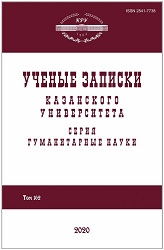Социально-историческая и теологическая составляющие в понимании сущности «большого» и «малого» джихада
Sociohistorical and Theological Components in Understanding the Essence of the “Greater” and “Lesser” Jihad
Author(s): Rinat Akhmatgalievich Nabiev, Ramis Albertovich FatkhullinSubject(s): Philosophy of Religion, Contemporary Islamic Thought, Sociology of Religion
Published by: Казанский (Приволжский) федеральный университет
Keywords: Quran; Sunnah; Muslims; pagans; jihad; battle; ayat; hadith; “greater” and “lesser” jihad;
Summary/Abstract: The study discloses the meaning of the term jihad, which is a constant source of disputes and misunderstandings among Muslims and representatives of other faiths. The linguistic and terminological meaning of the term jihad was analyzed. The derivatives of the term jihad in the Quran were considered. Comparison of the term jihad in the main collections of Hadith, because the Hadiths are most often used in interpretations to the Quran, was performed. It was revealed that, lexically and terminologically, the term jihad has the meaning not only of struggle, in various ways and means, but also denotes the value of exerting effort. The term jihad used in the Quran is presented in six categories: armed struggle, its financial support, peaceful confrontation, struggle with the help of language, Quran, and sharia establishments. Thus, its social component is reflected through the prism of Islam. At the same time, translators often misinterpret the linguistic and terminological meaning of the term jihad and its derivatives, which often leads to a wrong understanding of the ayah, if the tafsirs are not referred to. Therefore, it is necessary to accurately convey the linguistic and terminological meanings inherent in a particular ayah in order to avoid distortion of the meaning of the ayah and its understanding. The term jihad used in the main collections of Hadith comes not only in the sense of battle, but as a struggle with words and property as well, also in a social context: the fight against vices, caring for parents and loved ones. Regarding whether jihad is offensive or defensive, there are known differences. It was shown that jihad is a multifaceted tool, not an end in itself permitted by the God for good purposes, and may vary depending on time and place, as an example in the modern world information and economic opposition prevails, and military influence is used as a last resort. The military battles form an integral part of the history – cultural country code. In conclusion, we emphasized that the theological evolution of the term jihad and its division into greater and lesser is directly dependent on the socio-historical context of its origin and development. The greater jihad (obligatory for every believer) is a struggle primarily with the ego and its manifestations, then with the vices of society and its negative impact – this meaning developed originally and is always present in the term jihad. The lesser jihad has many manifestations, starting with peaceful preaching and good disposition and ending with tough, preventive measures that are directly dependent on external factors and the degree of interaction with them. The lesser jihad is temporary in nature and directly dependent on the greater jihad. The results obtained are important and can contribute to the establishment of harmonious relations between the representatives of Islam and other faiths.
Journal: Ученые записки Казанского университета. Серия Гуманитарные науки
- Issue Year: 162/2020
- Issue No: 1
- Page Range: 80-92
- Page Count: 13
- Language: Russian

